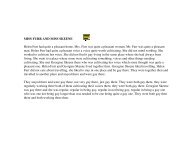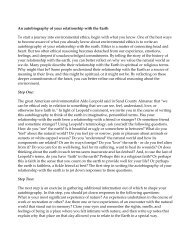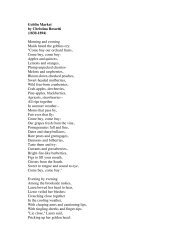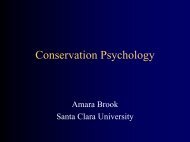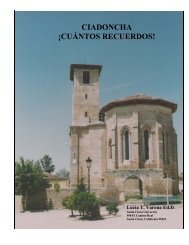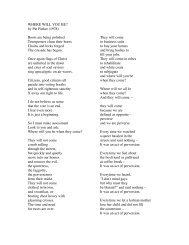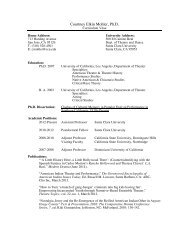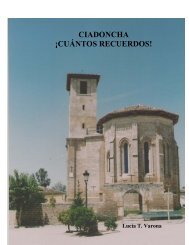ciadoncha; ¡cuántos recuerdos - Webpages at SCU - Santa Clara ...
ciadoncha; ¡cuántos recuerdos - Webpages at SCU - Santa Clara ...
ciadoncha; ¡cuántos recuerdos - Webpages at SCU - Santa Clara ...
You also want an ePaper? Increase the reach of your titles
YUMPU automatically turns print PDFs into web optimized ePapers that Google loves.
The invention of the tractor marked the beginning of the mechaniz<strong>at</strong>ion of<br />
agriculture. I could say th<strong>at</strong> when Ciadoncha reached this stage in life, I found two<br />
groups of people with different sentiments and memories. One group remembered the<br />
times before the tractor with a lot of nostalgia and another group was definitely happy<br />
with all th<strong>at</strong> the mechaniz<strong>at</strong>ion of agriculture brought with it.<br />
The group th<strong>at</strong> longs for past times is the one who gre<strong>at</strong>ly values the coexistence<br />
th<strong>at</strong> existed amongst the neighbors in those times. They said th<strong>at</strong> needing one another<br />
made them kinder and less preoccupied with the “wh<strong>at</strong> will they say?”, with how they<br />
dressed and of appearances. One participant gave me this example: “Before, we would<br />
go to church on Sundays without noticing wh<strong>at</strong> dress, wh<strong>at</strong> pendants, wh<strong>at</strong> shoes so-in-so<br />
had on. Today, if you do not go well dressed you feel bad.” It is clear th<strong>at</strong> it is not the<br />
hard work th<strong>at</strong> they long for, but the coexistence.<br />
On the other hand, the group th<strong>at</strong> said th<strong>at</strong> they are better off today is the one who<br />
remembers the hard work with certain bitterness. They said th<strong>at</strong> working the way th<strong>at</strong><br />
they did was inhumane. They do not know how the people were able to put up with so<br />
much. When I asked one participant from this group wh<strong>at</strong> she remembered about the<br />
work in the field, she answered, “I don’t even want to remember th<strong>at</strong>. Don’t compare the<br />
way we live now with those times”.<br />
The fields in Ciadoncha continue being worked on. For some time, there were<br />
more families working on their own lands, but with time and with their children<br />
inheriting the lands, the lands have become smaller and they have to have others work on<br />
them. Today there are adults who dedic<strong>at</strong>e themselves to working on their lands and on<br />
the lands of others. Of all of them, only one lives in the town. And per my convers<strong>at</strong>ion<br />
with him and his wife, I fear th<strong>at</strong> it’s not for very long. They are seriously thinking of<br />
moving to Burgos for their children’s educ<strong>at</strong>ion. With embarrassment, they say th<strong>at</strong> they<br />
do not see much of a future for their children in the town. The say, “the agriculture, with<br />
time, will remain only to those who have a lot of land. We small producers will have to<br />
figure out something else to do in another place”.<br />
But there was a time in which the mechaniz<strong>at</strong>ion and coexistence th<strong>at</strong> the field<br />
work offered was enjoyed. These were during the times th<strong>at</strong> there were still large areas<br />
of land th<strong>at</strong> had not been divided.<br />
139



